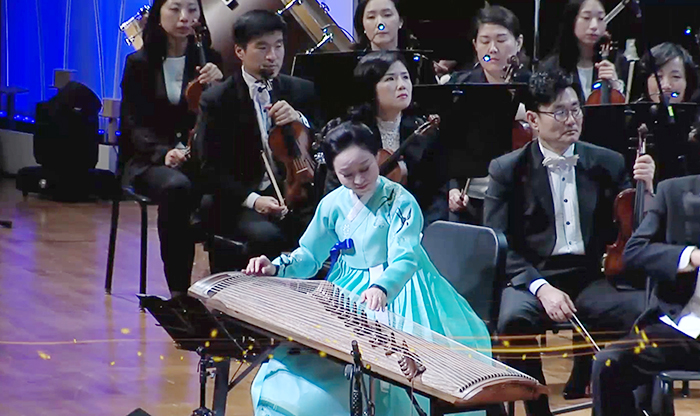
Arirang, an iconic folk song of Korea, has been newly made as a medley of its versions. Played alongside a Western classical music orchestra, the song will be performed at official functions in the future.
A concert to mark the new year took place at the Seoul Arts Center on Jan. 6. The concert featured a medley of versions of "Arirang" performed jointly by a Western classical music orchestra and a range of traditional Korean musical instruments, such as the 12-stringed zither, or gayageum, the cylindrical double-reed bamboo oboe, or piri, and the free-reed mouth organ made from 17 bamboo pipes, or saenghwang.
"Arirang" is the most popular traditional folk song in Korea, and is widely sung all across the country. The song varies from region to region and we can find people signing different versions of "Arirang" with slightly altered lyrics and melodies not only in both South and North Korea but also in parts of China and in some Korean communities in Eastern Russia.
The following are the basic lyrics of "Arirang":
아리랑 아리랑 아라리요
Arirang, Arirang, Arariyo
아리랑 고개로 넘어간다
Arirang gogaero neomeoganda
나를 버리고 가시는 님은
Nareul beorigo gashineun nimeun
십리도 못 가서 발병 난다
Shimrido motgaseo balbyeongnanda.
Translation:
Arirang, arirang, arariyo,
Crossing over Arirang Pass.
Dear who abandoned me here
Shall not walk even ten li before his/ her feet hurt
The “Arirang" medley was inspired by President Park Geun-hye’s vision to integrate the many versions of "Arirang" that are found across the country so that it can contain a meaning of hope and harmony, and to share the song of the Korean nation with its neighbors around the globe.
The medley is set to be performed at other official functions, too, such as state visits by overseas heads of state.
Click https://youtu.be/f-jcL5NaDLE to enjoy the song.
By Wi Tack-whan, Yoon Sojung
Korea.net Staff Writers
whan23@korea.kr